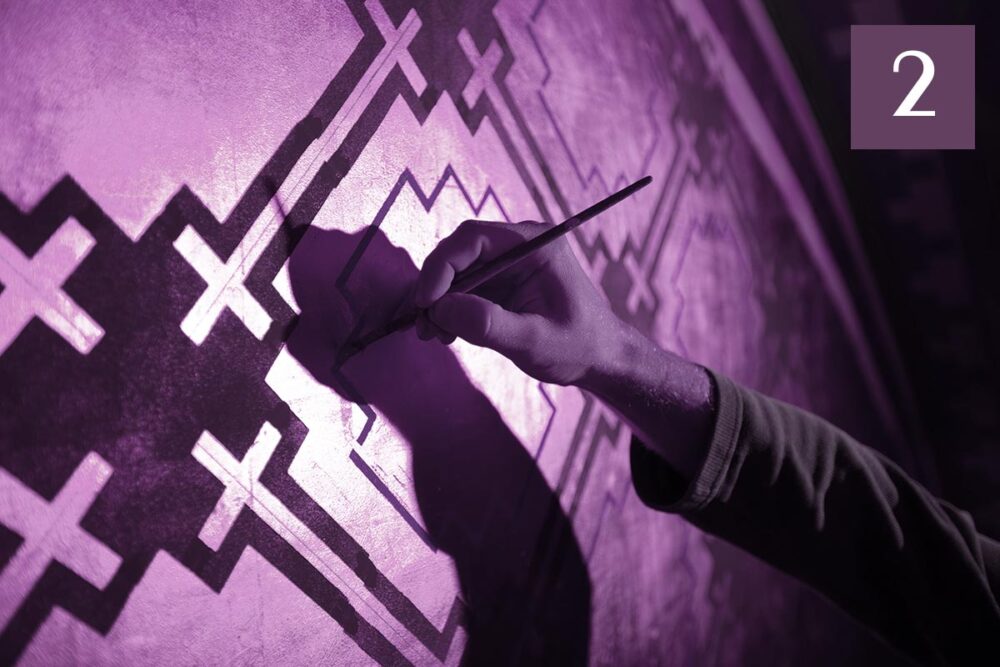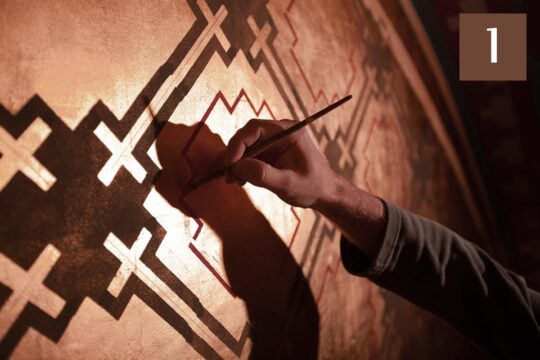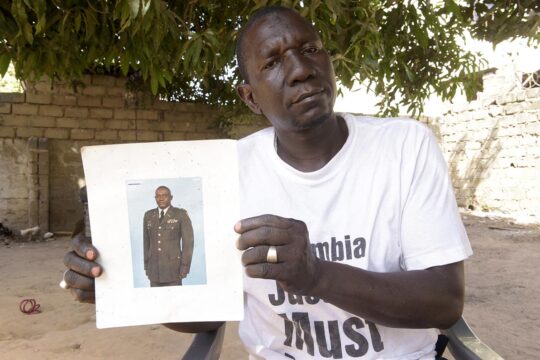Claudine*, who was one of the first to appear before the Independent National Authority for Recognition and Reparation (INIRR), seems to have had the worst experience. “I sent an initial email to the INIRR at the end of January 2022. A confirmation email arrived the same day, and then I waited three months for a consultant to call me. She asked me to talk about what I’d been through, and I talked for an hour. At the end of the line, I got the impression that she wasn’t really how I expected, not really listening. You have to realize it was the first time I’d told anyone what had happened to me. The days that followed were very painful because a lot of things came out. I asked to speak to this person again because I needed to clarify things, but I got no answer. I had to go through the general secretary of the INIRR, who rearranged a telephone meeting with my consultant. She then sent me the minutes of our meeting. It was completely different from what I had told her; she had interpreted a lot of things and embroidered. I didn’t recognize my story. I was able to rewrite the whole text, because in the meantime the details had become clearer, and my thoughts had matured. Eight months later, I finally got the verdict.
Michel: “I’ll always remember their first words: ‘We’ve read your file submitted to CIASE and we believe you.’ It was very restorative for me.”
Michel*, who went before the Commission for Recognition and Reparation (CRR) two months after Claudine, had a radically different experience. “I applied to the CRR on March 4, 2021. I was told that they were at my disposal: by video, telephone or physically in Paris. I live in Brittany. I went there three times in 2021 and 2022. It wasn’t a huge effort. I paid for train tickets to Paris, but it seemed to me that for my testimony to be heard and to receive reparations, I had to meet them. I was amazed that they were so accommodating of me and my schedule. I was received in the office of an international lawyer, the person assigned to my case. In the lift, I bumped into my other consultant, and realized I knew her. She’s a psychoanalyst whose books I have read. The secretary was attractive and friendly and offered me a coffee. I was immediately welcomed by the team and we got down to business. I’ll always remember their first words: ‘We’ve read your file submitted to CIASE and we believe you.’ It was very restorative for me.
The first appointment lasted 1 hour 30 minutes. They asked me specific questions: the colour of my attacker’s eyes, the colour of her hair. The fact that she wore a headdress all day meant that she was intimate with me, because she took it off. They were very warm and understanding. The second appointment was to tell me about the difficulties they were having with the nuns. The order of nuns never wanted to answer my requests, which were very neutral: I wanted to know if the nun in question was dead and where she was buried so as to visit her grave. I had promised to be very respectful.
My consultants ended up telling me, at the third and final meeting, that the only thing I could ask for was money, which I didn’t really want or need. A lawyer then called me, very dry, very cold: ‘I’m the spokeswoman for the nuns. If you promise not to write or publish anything, you’ll get the money.’ The CRR was sorry and warned me to think carefully before signing anything the congregation sent me ‘because it’s inappropriate to ask you this’, they told me. When I signed, I had a cheque from the congregation the next day.”
Véronique Garnier: “I hear lots people who tell me how much they are suffering as they go through the process. You expose yourself through your story. You’re being ‘judged’, because a panel of experts is going to assess your case.”
Véronique Garnier also went to the INIRR, and her experience was very different from that of Michel or Claudine. “I wrote an email to the INIRR in May 2022 and received an acknowledgement of receipt the same day. I then had a fairly brief call to explain the process to me: I was going to talk to a consultant, she would have me read over my statement, and a commission would study my file, which was anonymous, to award me financial compensation. I waited more than two and a half years between that phone call and the first appointment. I knew it was a long time. I also knew that I wasn’t the most unfortunate, the worst off, or the most isolated. The big problem for victims of the Church is isolation. I was less isolated than many others, because I was surrounded by a husband, children and grandchildren. I don’t think people have to wait as long today, but at the beginning the commission was overwhelmed, because everyone arrived at the same time. It was completely overwhelmed.
Then, I must say I had to fight. I came across a consultant who wasn’t at all competent. We were on video, and she seemed stressed and in a hurry. She told me she was under pressure from the media. I wondered why she was telling me this, because it wasn’t my problem. She didn’t have a professional Zoom link and we had to reconnect three times. In the minutes, she wrote that we’d had three meetings! And above all, her summary was done in a hurry. I read it and said to myself ‘that's not my story’. I asked for someone else.
Another appointment was scheduled with a wonderful person, who listened to me, and we made corrections to the summary. It was painful and difficult to tell my story twice, but this person was exceptional and a great listener. She agreed to emails back and forth and phone calls for a few words. I was always looking for the right word, because I think that when you’ve suffered such injustice, you’re extremely sensitive to saying things right. I always thought it was old news and that I would never get justice. If these commissions are telling victims that justice can be done, then it has to be tailored to each individual. It’s tailor-made every time.
I hear lots of people telling me how much they are suffering as they go through the process. You expose yourself through your story. You’re being ‘judged’, because a panel of experts is going to assess your case. Once the file was finished, they sent me a letter: I cried like a baby to see it written that they ‘believed’ what I had told them. It’s a written acknowledgement, which is extraordinary, in fact. My two attackers died a long time ago and I never imagined that anyone would acknowledge what I went through in this way, let alone by receiving money.
Yolande du Fayet de la Tour: “I was assigned a person on the INIRR payroll, a trainee psychologist. She had no experience. She was very nice, but I’m a psychotherapist myself, and I was very aware of the limits of her listening skills.”
Yolande du Fayet de la Tour hesitated for a long time before taking the plunge. “It took me a long time to submit my case because I didn’t feel I had the right to ask a commission for something without any proof. I was 5 and then 11/14, so I didn’t have any tangible evidence, having never spoken at the time. I started by doing some research on the Internet. Thanks to my speaking out on YouTube, I found a childhood friend. It was she who made me realize that I hadn’t been abused just once, as I’d thought, but that the abuser had continued for four years in front of her and her mother. In this way, I was able to compare the modus operandi of this predator with all the other victims I found.
At first, I didn’t think of getting compensation, and then little by little I told myself that there was no reason for me to lose out. I had already lost out in my family because I’d kept quiet for 40 years. So I submitted my application to the INIRR in September 2023. I got a written reply from the secretary within 48 hours, and then she very kindly called me to explain what was going to happen. They’re nice, courteous people. I’d already spoken to so many victims that I knew how things were going to work and where things were going wrong, thanks to the experience of victims within associations. I had my first appointment a few days before Christmas 2024. So I’d been waiting 16 months. I told them: ‘I’m warning you, I only want to be seen by a professional’. They called me back a week later to tell me that I’d been assigned someone on the INIRR payroll, a trainee psychologist. She had no experience. She was very clear and explained that she was going to write a two-page summary of the main points. The purpose of the interview was to give the commission an idea of my story, so that they could decide how much money I should receive.
“You need to be prepared for this interview”
You need to be prepared for this interview. If you set out with the idea of really being listened to, you run the risk of getting lost in very emotional things, of forgetting the most important things, those that count for deciding on compensation. And I tell the victims I meet: find out about the assessment grid before you go, because you mustn’t lose sight of the fact that these commissions are not independent; they are beholden to the logic of the Church. For example, if the Church has dealtwith the harm, it is less serious and the victim will receive less compensation. For example, what is very serious for the Church, but also forms part of the commission’s criteria, is if the predator used a sacrament for sexual purposes, to obtain silence or, even worse, to assault. So if you’re a victim who has been abused by a priest at a holiday camp, it’s not the same as if you’ve been assaulted during confession. On that point it wasn’t very clear to me; it happened in my bedroom when I was five, but afterwards too. But thanks to my friend’s testimony and memory, I was able to find out more and recognize that he used confessions with her mother as an excuse to come to me in my room. That is why it’s so important to make sure you don’t feel manipulated and abused again, before you go to the commission. I received my compensation in April 2025, and it corresponds to what I expected.”
Gilbert: “I received my compensation at the end of February 2025. What I see from these commissions is that the results obtained depend on the consultants. There are people who are more or less qualified.”
Gilbert* was one of the first to take the plunge. But he didn’t receive his compensation until shortly before Yolande. “I submitted my claim to the CRR at the end of October 2021. I was file number 5, so one of the very first. I received a confirmation email within a minute, then waited until June 2022 for my first interview with my consultant. She was a good listener, I felt reassured and at ease. She then emailed me the self-assessment questionnaire on the harm done to me, which I returned to her the same day, having filled it in with a pen and scanned it. Some of the questions seemed awkward, but with hindsight I think that was mainly my own emotional perceptions. In March 2023 I had another appointment by video for over an hour. I felt that the person I’d already spoken to was overwhelmed by her emotions. The other person present wasn’t talkative, I’d say she was good in her role as shrink...
Then I waited for months and was told that I was changing consultant, without any further explanation. I spoke to her in June 2024, still at a distance. She was very warm. She’s a a justice professional, and she did a good job. As it was impossible to put a name to the rapist, she organized two meetings with me in Paris during 2024 with a representative of the Marist Brothers to present me with a selection of photos so that I could try to name my attacker. I received my compensation at the end of February 2025. What I see from these commissions is that the results obtained depend on the consultants, and there are people who are more or less qualified.”
Nanou Couturier: “The commissions don’t realize the damage that waiting can do.”
Nanou Couturier, who applied for compensation as soon as the commissions opened, says: “My case took two years because an initial proposal didn’t suit me (lifelong veterinary care for my dog). Two years is a long time. It can even be a tragedy. I know some people who have committed suicide because they’re fed up, because life is becoming far, far, far too complicated. They are already weakened, so it’s a crushing blow. The commissions don’t necessarily take responsibility. They don’t realize the damage that waiting can do.”
François Devaux didn’t have the strength to see the process through. “As soon as the INIRR came into being, I signed up. I didn’t hold out much hope, but I wanted to see how things went. Initially, I went in a fairly neutral way to see if the reparations process was up to the challenge. It was only afterwards that I changed my mind. The few exchanges and responses I had with them were in the form of mass emails telling us that they were running late and wouldn’t have time to deal with our case for another month or so. So there was no physical meeting. I didn’t think that was appropriate at all, and it seemed to me to be flouting the basic rules of what constitutes the redress we were promised. It really seemed to me a strategy of reparation that consisted more in repairing the Catholic Church than the victims. I found it wrong, aggravating the trauma, and making the victim morally responsible for a poorly constructed process.
* Pseudonym
THE INIRR
The Independent National Authority for Recognition and Reparation (INIRR), based in Paris, assesses reparation claims from victims of sexual violence perpetrated by members of the clergy. It is made up of 20 commissioners, half salaried and half voluntary, appointed by the President of the Commission, Marie Derain de Vaucresson. After an interview, the commissioners handling the case fill out a chart, which is not communicated to the victims, to assess the harm suffered. The severity of the damage is assessed on three levels: the events themselves; their long-term consequences; and any shortcomings on the part of the Church. A scale of 1 to 10 has been established for each factor, and aggravating factors are sometimes taken into account. As of March 10, 2025, the average age of victims interviewed was 61, and 34% were women.
THE CRR
The Commission for Recognition and Reparation (CRR), based in Paris, examines reparation claims from victims of sexual violence committed by lay people within the Church. It has 29 members appointed by President Antoine Garapon. The assessment of each situation is based on two factors. The first is characterization of the abuse by a member of the commission. The second is entrusted to the victim. The victim is asked to rate, on a scale of 1 to 7, the consequences of the violence in various areas of their life. The CRR makes recommendations to the congregations where the abuse occurred on financial and symbolic reparations. As of December 31, 2024, 89% of victims were aged over 50, 65% were men and 35% were women.
Also read: Repairing violence within the Church: “It’s going to take time”








